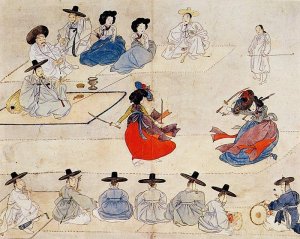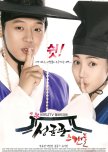I started Sungkyunkwan Scandal expecting fluff and eye candy. The pretty cast and brightly colored posters suggested college hijinks with hanboks, and there was indeed plenty of cute, anachronistic fun. What I didn’t expect was solid writing that would use the not so light and fluffy realities of the show’s historical era to poke a sharp stick at Neo-Confucianist ideas about gender, class, sexual orientation and filial piety. The four central characters are given multidimensional, compelling relationships, and while I wish the two leads were played by more dynamic actors, Yoo Ah In and Song Joong Ki are marvelous. The show recognizes that while college in any time period may contain lots of frivolity, petty rivalries, romance, and odd initiation rites, it is most crucially the place where young idealists take aim at the cynicism and corruption of their elders.
Unfortunately though, while the show is willing to raise provocative issues, it’s unwilling to really deal with the ramifications of those issues. A world where being an educated woman or a gay man is a capital crime is hardly likely to provide a happy ending for nonconformists. Instead of confronting this head-on, the drama drifts into fantasy in its final episodes, substituting feel-good platitudes and miraculous solutions for the difficult problems it has so compellingly presented. This allows it to maintain its romantic comedy credentials, but at the cost of what could have been a much darker, but also much more honest show.
Vond je deze recentie nuttig?

























